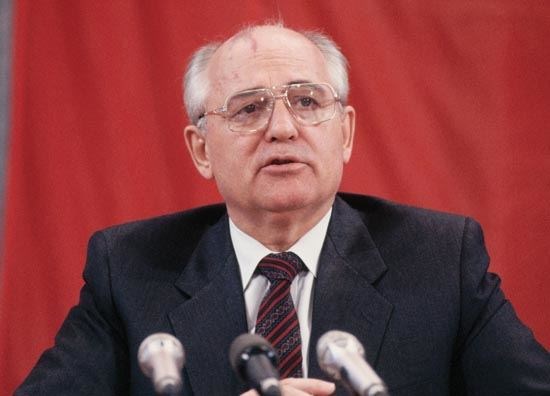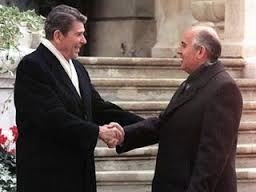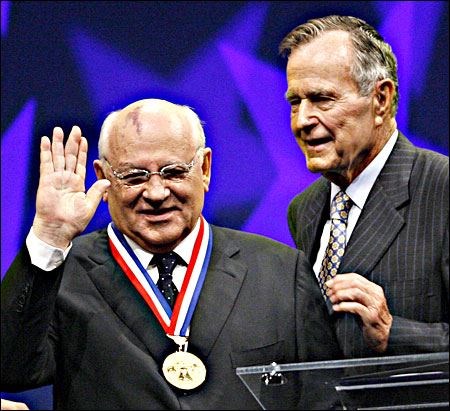 |
| (www.britannica.com ()) |
"Tear down this wall!" Four iconic words known around the world for their role in ending the Cold War. When they came out of President Reagan's mouth, they became a battle cry. But what most don't know is that there was a person on the "wrong side" of the conflict against communism who was more necessary to bringing democracy throughout Eastern Europe than the Americans, his name was Mikhail Gorbachev. Born in Stavropol, Russia, Mikhail saw firsthand the horrors of Soviet Russia under Stalin. He witnessed his family fight for survival during the great purge in which food prices were raised astronomically. This made him want to make a difference in the government. As a young adult he worked as a hand at a state farm, which helped him in his political aspirations. He later met his wife, Raisa Torenko while studying law at Moscow State University ("Mikhail Sergeevich Gorbachev"). He then began his dizzying rise up the ladder that was the government until the "Politburo elected Gorbachev general secretary of the CPSU. Upon his accession, he was still the youngest member of the Politburo" ("Gorbachev Mikhail"). As he became the head of the Communist Party, he started to display his true heroism. Mikhail Gorbachev should be considered a hero because of the traits he possesses that other heroes have as well: bravery, compassion and leadership. Gorbachev should be considered a hero because of the fact that he cared about his people resulting in reforms to the government, he was a wonderful peacemaker and born leader as displayed in his many peace talks, and he bettered relations with other western powers which laid the foundation for improvement of Soviet economy.
 |
| Gorbachev meeting with Reagen (mrkscoldwarb.wikispaces.com ()) |
While Gorbachev ascended through the ranks of leadership in the Soviet Union, he always had one thing on his mind, reforming the government. He felt that he needed to do this because of the suffering he witnessed in his homeland and virtually everywhere else he went. Once he got into power, he introduced many reforms to help his people. " Earlier that same year, Gorbachev announced a new series of domestic reforms, including expanded freedoms and the democratization of the political process, all of which were to be achieved through his policies of social and economic restructuring, or perestroika, and openness, or glasnost... It was also in 1988 that Gorbachev first expressed his intention to end the Communist party's control of the day-to-day operations of the country and create new, elected political institutions"("Mikhail Gorbachev"). This displays Gorbachev's boldness and willingness to go where no others during that time went, he reformed the government in a way that benefited his people. It also demonstrates how Gorbachev was not afraid to turn to democratic values, and that he was a pioneer through these reforms. He called for further reforms, even helping his people elect their leaders. "...he called for rapid technological modernization and increased worker productivity, and he tried to make the cumbersome Soviet bureaucracy more efficient...multi candidate contests and the secret ballot were introduced in some elections to party and government posts" ("Mikhail Gorbachev" Encyclopedia Britannica). He risked it all when he implemented the "secret" ballots because it was against the Communist Party and he risked getting booted out of power. His selflessness showed through in these revolutionary reforms. They were instrumental in bringing democracy to the Soviet Union, he also tried to boost the economy, that plan bore fruit after he was out of power, however. Through all of his brilliant reforms, Gorbachev helped his people and his economy become more free and democratic, making life better for most who were stuck inside the "Iron Curtain."
Not only was Gorbachev a visionary, he was also a wonderful peacemaker and leader, and one that his country needed. He did many things to end wars and to make peace with the west and even in Afghanistan."In December 1987 he signed an agreement with U.S. President Ronald Reagan for their two countries to destroy all existing stocks of intermediate-range nuclear-tipped missiles. In 1988-89 he oversaw the withdrawal of Soviet troops from Afghanistan after their nine-year occupation of that country...Gorbachev was the single most important initiator of a series of events in late 1989 and 1990 that transformed the political fabric of Europe and marked the beginning of the end of the Cold War" ("Mikhail Gorbachev" Encyclopedia Britannica). Gorbachev saved many Russian lives by pulling troops from Afghanistan and signing an all important nuclear treaty with the U.S., which was extremely important to ending the Cold War. Not only did he save Russian lives with treaties, he also saved thousands of innocents which may have been killed in Cold War proxy conflicts, such as the Vietnam War and Korean War, although these were before his era, had he not signed these treaties, he could have had to deal with another conflict. Not only did he sign treaties to save lives, he also put a lot of effort into saving the economy. "Gorbachev became Soviet leader as the country's economy was beginning to decline. In 1985, he announced that drastic changes were needed to modernize the economy and make it more productive. He proposed to move from the Communist system-in which the government controls the economy-to a system with less government control." (Goldman). His great leadership is displayed here because he was thrown into the deep end, if you will, but still did all he could to make sure that the economy didn't tank. He even reduced his own power by making sure that the government had less control over the economy making it more of a free market. Throughout his presidency he made sure that blood wasn't spilled and that the country was better off than when he inherited it. He demonstrated his peacemaking and leadership qualities by looking out for his citizens.
 |
| Gorbachev accepting the Nobel Prize (jovialanne.blogspot.com ()) |
Along with making peace with western countries, he helped the Soviet create trade relationships. He did many great things to bring about warmer perceptions from the west, the most notable of which was bringing down the Berlin Wall. "Perhaps the most dramatic moment of the year came on November 9 with the opening of the Berlin Wall, for nearly thirty years a grim reminder of the hostility and suspicion dividing East and West. Gorbachev was universally acclaimed as the man who had finally brought the Cold War to an end...Gorbachev had won the 1990 Nobel Peace Prize for his bold moves to improve the international political climate."(Goldman). By bringing down the Berlin Wall, Gorbachev showed the west that Russia was ready to change and were no longer a strict ultra communist regime, causing more countries to open trade with Russia. With his brilliant actions, he won the coveted Nobel Peace Prize, although this did not mean much to Russia at the time as they were in the process heavily reforming, it signaled an era in which Russia and other countries were no longer at war and these countries improved trade relationships. He also worked very hard to make sure there was no tension at all. "Gorbachev worked to improve Soviet relations with the Western countries and to reduce tension and conflicts worldwide" (Goldman). Gorbachev worked hard during his time in office by following through with his vision by ending conflicts and making sure new ones couldn't arise. While doing this, he helped open doors to trade and travel and this went on to help the struggling Soviet economy. They were now able to import and export improving the Russian standard of life. Even after he ended wars and created peace, Mikhail Gorbachev worked tirelessly to make sure that Soviet relations with other countries improved massively.
Through his bold reforms, his great leadership and peacemaking, along with his drive to improve relations, Mikhail Gorbachev is a true hero and as said in an article, Gorbachev was, "...the man with whom Margaret Thatcher and Ronald Reagan could do business."(Encyclopedia Britannica). His leadership led Russia to democracy and saved many lives during the tough times. To me Gorbachev will be forever a hero because he not only saved his country's economy, he even was willing to be the villain in the eyes of some government officials just to bring about change. Ultimately he should be judged as a hero because he raised the standard of life in Russia as well as giving the people power, and saving millions of lives. As said by many in the west, Gorbachev lost his country in the process of changing the world. He was revolutionary and a visionary and will stand the test of time and ultimately be judged as a hero.
Works Cited
Goldman, Stuart D. "Gorbachev, Mikhail Sergeyevich." World Book Student. World Book, 2016. Web. 3 Feb. 2016
"Gorbachev, Mikhail." Britannica Biographies (2012): 1. Biography Reference Center. Web. 28 Jan. 2016.
"Mikhail Gorbachev". Encyclopædia Britannica. Encyclopædia Britannica Online.
Encyclopædia Britannica Inc., 2016. Web. 03 Feb. 2016
<http://www.britannica.com/biography/Mikhail-
"Mikhail Gorbachev." Contemporary Heroes and Heroines. Vol. 2. Detroit: Gale, 1992.Biography in Context. Web. 27 Jan. 2016.
"Mikhail Sergeevich Gorbachev." Encyclopedia of World Biography. Detroit: Gale, 1998. Biography in Context. Web. 27 Jan. 2016.
Page created on 2/18/2016 12:00:00 AM
Last edited 2/18/2016 12:00:00 AM
